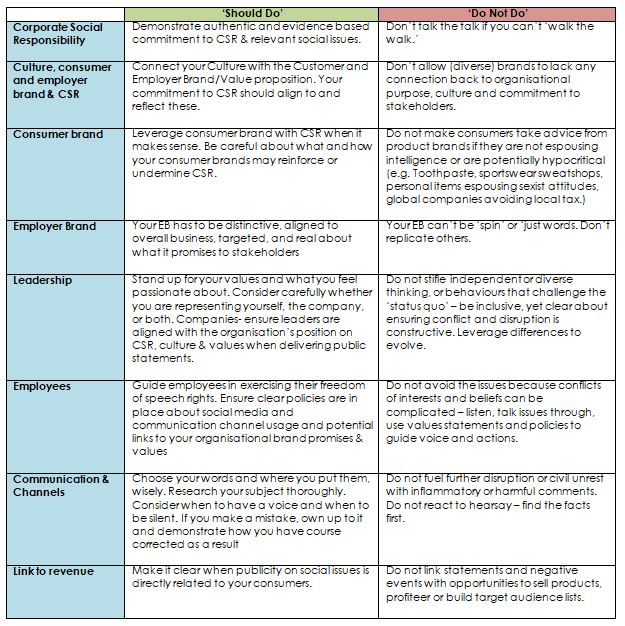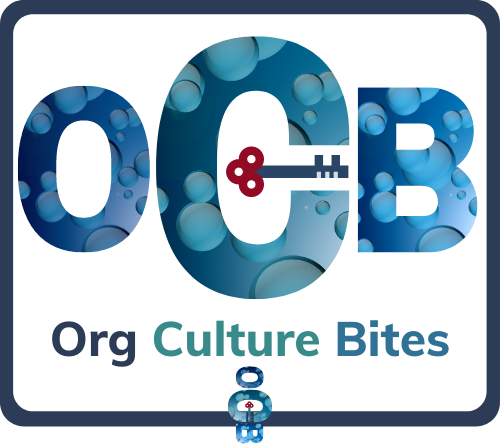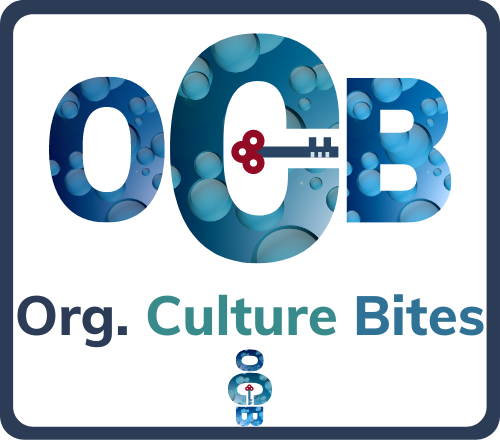-
 play_arrow
play_arrow
-
 play_arrow
play_arrow
-
 play_arrow
play_arrow
-
 play_arrow
play_arrow
- Home
- keyboard_arrow_right Advisory
- keyboard_arrow_right Capability Development
- keyboard_arrow_right Should companies make public statements about social issues?

In our tumultuous world, where the use of personal recording devices and social media has washed a tide of transparency over our day to day activities, people are becoming more aware of social harm or injustices. Through digital channels, more voices are being heard, more examples made visible, as they occur. We are urged to make active choices about right, wrong, our beliefs and make ethical decisions about how we lead our lives. If individual voices are being heard more and have greater influence in political debate, what role do organisations, leaders and brands have influencing positive social change?
Organisations are taking more notice of the need to build trust and demonstrate corporate social responsibility, to be attractive to investors & a broader view of stakeholders.
There has been a growing insistence from communities and shareholders for organisations to take greater responsibility for social, environment and broader stakeholder issues. Responsible businesses are more attractive to invest in and work for, good for business, employees and the community. In Blackrock’s famous 2020 letter to CEOs from Larry Fink they asserted their belief that ‘sustainability should be our new standard for investing.’ If investment and capital will increasingly be allocated to those companies with the most sustainable business models, organisations will need to demonstrate their commitment to addressing issues like climate change, economic opportunity, and stakeholder well-being.
In order to offer value to shareholders, organisations must also be able to demonstrate a clear causal link between commitment to ESG issues and the positive impact on revenues over time.
In Australia, we want large multinationals to pay taxes fairly in the locations in which they operate, mining companies to be sustainable – preserve sites of environmental, historical and cultural significance, our banks to do the ethical or ‘right thing’ by customers before shareholders. We want our carbon emissions to be reduced with measures to prevent irreversible damage to our environment, and our community to be more inclusive – embracing our religious, gender, racial or political differences for collective prosperity.
Recently, we have seen events such as ‘COVID-19’ and the ‘Black Lives Matter’ movement further elevate our awareness, global connectivity and the need for better balancing humanity with the economy and politics. Socially, individuals, groups and organisations seem to be weighing in more heavily on what has traditionally been a political domain. Social media has given a more visible and accessible platform to influence outcomes. People are more empowered, urged to reflect on their own values, take a stronger, more visible stance, to challenge historical beliefs, decisions or symbols and take action for change. Challenges to ‘the status quo’ are being publicly made by individuals, groups, politicians, leaders and organisations.
Making core aspects of your culture and beliefs visible, as well as demonstrating your corporate values, is an important part of reinforcing your Employer Brand.
According to a LinkedIn Employer Brand research report in 2016, a strong employer brand – an individual having a positive impression of your company as a place to work – is twice as likely to be linked to job consideration as a strong company brand. Furthermore, a strong employer brand is especially critical for attracting candidates from younger demographics, globally and is likely to reduce the cost to acquire top talent. Strong employer brands can save you money AND increase your talent returns.
However, if ‘what you promise’ is not stacked up with ‘what you deliver,’ your Employer Brand can quickly and deeply suffer – most likely alongside reduced engagement, productivity, increased turnover and associated talent costs. This is why it’s important to make sure that what you – the organisation AND your leaders representing the company – say is authentic, aligned and will be delivered upon.
So, on balance, the suggestions is that yes, organisations should make their position known on public issues and take responsibility for being part of the changes they wish to see in the world, especially when it aligns well with their purpose and values. In general, people want to know and see that corporates are progressive, have a conscience, are ‘doing the right thing’ for the customer, employees, society and environment, as well as economically.
However, organisations and leaders should also take due care when they consider what statements they wish to make publicly, why it is important, when they make them, how they have – or will act differently. They must also be certain that their actions meet their words.
Organisations and brands making statements on public issues also face the risk of it backfiring.
It may be a fine line, but consumers are smart and like most of us, don’t like to be lied to or taken advantage of. Trust in organisations and brands will plummet if declarations about their values, commitments or promises are not met with the right, visible actions that reinforce them.
Similarly, brands that partake in political and social activism are also at risk of their initiatives backfiring. Expect discomfort if statements made by product brands about ‘beliefs’ or public issues do not resonate well with all customers. Procter & Gamble’s advertisement for Gillette products in 2019 made a bold, public stand against sexism, bullying and harassment. This caused significant rejection by many of its male customers, complaining the ad made them feel ‘marginalised and criticised.’ Although it’s not exactly clear if subsequent losses were directly due to this backlash, customer loyalty was certainly challenged. Furthermore, some consumers just didn’t want to be told what to believe, how to think or behave by an inanimate ‘personal care’ product.
It is to be seen whether organisations like this continue the strong public stand they make in the face of potentially losing sales, as they weigh up short term revenue targets with longer term, uncomfortable commitments leading ‘change for good.’ Will organisations make short term losses in order do ‘the right thing?’ Ultimately, will ‘doing good’ for customers, the environment and societal injustices be better for our communities, economies… and decision makers in business?
This takes us back to the argument where shareholders need to see a direct, positive link between CSR and profitability in order to be attractive. It forces organisations to strongly consider the broader value of investing in socially responsible activity, if it doesn’t make them money. On the flip side, neither is it attractive (or ethical) for the public to see organisations blatantly profiteer from situations of violence, civil unrest or crisis. We were impressed by stories of organisational compassion, flexibility and care during COVID-19, but didn’t like the extortionate price hikes on toilet paper, hand sanitiser and masks.
Branding, whether it is for a company, service, product or employer reputation is intertwined with the complexity of people, our changing society, culture and values. Arguably, consumer ‘brands’ may not have ‘beliefs,’ but humans do. Employer brands represent the company, yet it’s the people that bring brands to life through their decisions, actions and behaviours. This is another area where we can get unstuck – when the organisation’s theory isn’t always met with the practice. Beliefs are very personal, humans are sensitive, our actions and behaviours are not always aligned or ‘on brand.’
An example of this is the case of Israel Folau vs Rugby Australia in 2019. In Australia, everyone has the right to freedom of speech, where personal views may indeed be contrary to organisational culture and publicly espoused values. In this instance, the employee (Folau) had his employment terminated when he publicly made disparaging comments about certain sectors of the community, which was alleged to be in breach of the employer’s code of conduct. In settlement, despite their conflicting personal positions, both parties declared the commonality of their beliefs publicly and resolved their differences. This event highlighted the need for organisations to consider their position and the extent to which they can enforce their values lawfully. Both parties, through a legal mediation process, were required to take the time to really listen, understand the different perspectives, and consider shared as well as conflicting beliefs, as a starting point for discussion.
In summary, corporations today play a more transparent and significant role in shaping the way we respond to public issues. The way businesses deal with conflict, through cultural practices, mindsets, norms, their leaders, teams, processes – all influence the way we personally reflect upon and address challenges. How organisations involve themselves in social conflicts also impact the way competitors behave, as they seek to differentiate, represent value to the customer and uphold industry ‘best practices.’
When considering whether to make public statements about broader societal issues in the future, a healthy first step may be ensuring you get your ‘own house in order.’ More specifically, this would include articulating an organisational purpose that gives focus and meaning to what you do, who you do it for and why you do it… inspiring customers, employees and the community to connect with your ‘reason for being.’
This critical step should also involve careful review of the level of responsibility you choose to take on social issues and why. Clearly define and align behind an internal culture, values, leadership behaviours and practices that enable your people to deliver on the promises you make to stakeholders about what you stand for.
Importantly, take the time to evaluate how effective you are at actually doing what you say. Ensure robust measures are put in place to track and monitor your performance – how you deliver on your promises and ‘walk the talk.’ Be honest with yourself when things aren’t meeting expectations and take tangible, corrective action… or risk losing trust.
Below are a few tips that may be useful to think about:

Article written by Angela Lewis
Founder & Director of Org. Culture Bites
© 2015 - 2019 Orgculturebites. Trademarks and brands are the property of orgculturebites


Post comments (0)